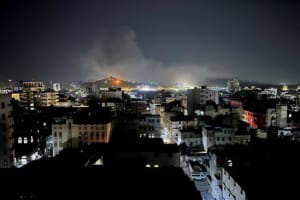Activist who called for Passover sacrifices at the Temple Mount is arrested
Chairman of the ‘Return to the Mount’ movement detained for ‘disturbing the public peace’

Rafael Morris, head of the “Return to the Mount” movement, was reportedly detained by the Israel Police yesterday on suspicion that he would attempt to sacrifice a goat on the Mount.
The group “advocates the building of the Holy Temple in its place on Mount Moriah” and similarly seeks to restore Passover sacrifices atop the Temple Mount,
Last Friday, the Return to the Mount announced it would compensate activists arrested by the Israel Police on their way to the “Passover sacrifice” on the Temple Mount this coming Wednesday.
The announcement promised to compensate an individual with 500 shekels (about $140 USD) if he or she is arrested while going to attend a sacrifice. A person going to the Temple Mount with a lamb to sacrifice, was to receive 1,200 shekels ($336 USD). If the arrest happened at the Temple Mount, the group promised to pay 2,500 shekels (about $700 USD).
Last month, Return to the Mount ran into problems with the Israel Police after its activists were arrested while putting up signs in Arabic offering to pay anyone willing to hold a Passover on their property.
In a recent television interview, National Security Minister Itamar Ben Gvir encouraged Jews to visit the Temple Mount during Passover but said he does not support animal sacrifices. A leading ultra-Orthodox newspaper, Yated Neeman, wrote a front-page article denouncing Return to the Mount’s attempt to conduct a sacrifice.
“It is forbidden in religious law and also dangerous,” said the headline, calling the groups actions “messianic and nationalist madness.”
According to the Lebanese newspaper Al-Akhbar, which is affiliated with the terror group Hezbollah, Hamas has criticized the attempts made by Return to the Mount to “change the status quo,” stating that “Israel will bear the consequences” of any attempt to bring a sacrifice to the Mount.
Referring to the stabbing attack on Tuesday morning, in which two IDF soldiers were injured, Hamas spokesman in Jerusalem, Muhammad Hamada, declared: “We welcome the stabbing attack, which is the first response to the war waged by Israel on the Al Aqsa mosque and the intention to make a sacrifice. What’s to come will be even worse.”
Last week, a group of rabbis sent a letter to Ben Gvir and Israeli Prime Minister Benjamin Netanyahu, asking them to allow Passover sacrifices at the Temple Mount this year.
In January, shortly after Ben Gvir’s visit to the Temple Mount, which prompted an immediate outcry within the Arab world, Morris had sent a letter to Ben Gvir, asking him to allow Passover sacrifices on the Temple Mount.
“We have now a golden opportunity to return our old glory and renew the Passover Sacrifice for the first time in some 2,000 years, a move that will surely hasten our redemption and be written in the pages of history as the start of the construction of our Third Temple,” the letter stated.
“Return to the Mount” is not the only group seeking to restore Passover sacrifices on the Temple Mount. A group associated with the Temple Institute, United Temple Movements, has conducted reenactments of the Passover sacrifice in Jerusalem near the Temple Mount.
United Temple Movements in the past has requested and received permission for its reenactments, making it clear that, while it supports and longs for the return of true sacrifice to the Temple Mount, it does not consider its reenactments to be an authentic Passover sacrifice.
In a move to prevent unauthorized attempts to make Passover sacrifices, Chief Rabbi of the Western Wall and the Holy Places Shmuel Rabinowitz banned the transport of animals to the Temple Mount earlier on Tuesday.
“The Western Wall Heritage Fund operates according to the instructions of the Chief Rabbinate of Israel, which for generations has opposed any act of this kind, and in accordance with the authority of the Western Wall Rabbi, has been preventing such actions for years, and will continue to do so this year as well,” said Rabinowitz’s statement.
The overlap of Passover, Easter and Ramadan this year has led to increased religious tensions in the city of Jerusalem. Police have been on high alert for several days, seeking to prevent the outbreak of religious violence between the different groups.
Israeli police allows for visits by Jews to the Temple Mount during the Muslim month of Ramadan but in an attempt to keep tensions down, the visiting hours are shortened compared to the rest of the year.
Israel usually allows greater numbers of Palestinians, including from the West Bank and from Gaza, to visit Al Aqsa Mosque during Ramadan.

The All Israel News Staff is a team of journalists in Israel.














